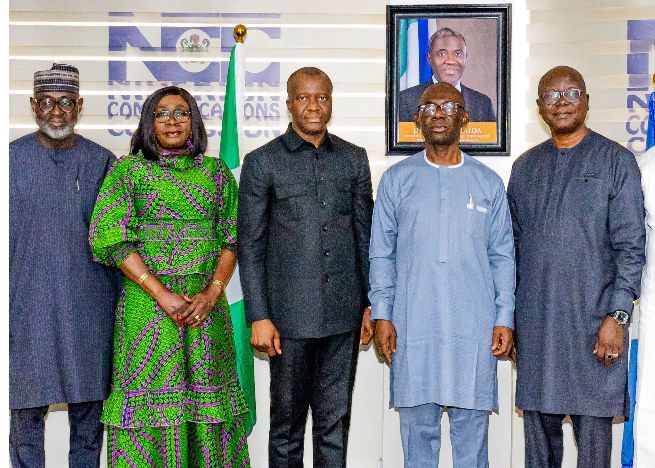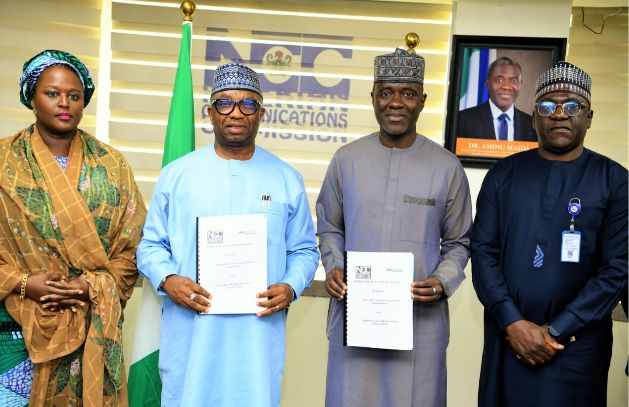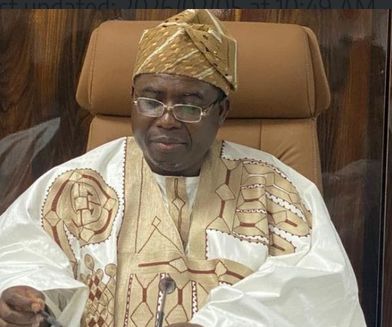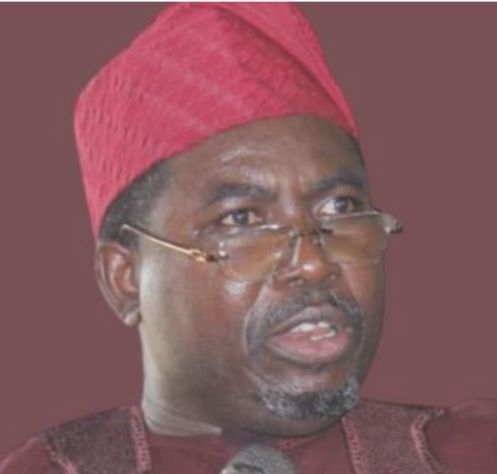We’re Determined To Collaborate With Countries In West Africa To Drive Expansion Of Digital Economy – NCC Boss

The Executive Vice Chairman and Chief Executive Officer of the Nigerian Communications Commission (NCC), Dr. Aminu Maida has expressed the determination of the commission to collaborate with countries in the West African sub-region to bring about the expansion of digital economy and good life for the people.
Playing host to a high-level delegation from the Liberia Telecommunications Authority (LTA) at the NCC’s Head Office in Abuja at the weekend, Dr. Maida stressed that the Commission is ever dedicated to strengthening partnerships with telecommunications regulators within the West African sub-region.
Represented during the visit of the LTA by the Director of Corporate Planning, Strategy and Risk Management at NCC, Dr. Kelechi Nwankwo, the Commission’s Boss referred to the Commission’s nmandate, including collaboration with sister regulatory institutions within the sub-region and beyond to drive the expansion of digital economy and improve the living conditions of citizen.
 He said that given the NCC’s long-standing commitment to regional cooperation through platforms such as the West Africa Telecommunications Regulators Assembly (WATRA), the Commission has no doubt that the region would be stronger and more prosperous when all countries are interconnected.
He said that given the NCC’s long-standing commitment to regional cooperation through platforms such as the West Africa Telecommunications Regulators Assembly (WATRA), the Commission has no doubt that the region would be stronger and more prosperous when all countries are interconnected.
The Executive Vice Chairman stressed the great importance of collaboration, adding that it is a core driver of the NCC Board.
He said that sustained engagement with regional partners is essential to advancing the interests of telecommunications consumers and various stakeholders.
Dr. Maida recalled the Commission’s advocacy for the recognition of Information and Communications Technology (ICT) as critical national infrastructure within the Economic Community of West African States (ECOWAS), saying that Nigeria has already designated ICT as part of its critical national information infrastructure to give it the prominence required for sustainable growth.
He assured the Liberian delegation of the NCC’s readiness to provide support in advancing regional shared initiatives and translating discussions into actionable outcomes within the sub-region.
This was even as the Chairman of the Board of Commissioners of the LTA, Clarence Massaquoi, commended the NCC for making itself available in the spirit of regional coordination and collaboration, describing the engagement as critical to strengthening regulatory responsibilities across the sub-region.
Massaquoi acknowledged Nigeria as the largest economy in the region and a central player in Africa’s communications, security and economic structures, admitting that progress made by Nigeria often has far-reaching impacts across other West African countries.
He said that since his assumption of office as the Liberian chief telecom regulator, the LTA has prioritized strengthening relationships with regional institutions to support ECOWAS’ vision of integration as effective regional integration cannot be achieved without affordable and reliable communications services, particularly in addressing cross-border roaming challenges.
The LTA Chairman said that Liberia had signed bilateral agreements with The Gambia and Côte d’Ivoire and is at advanced stages of discussion with Ghana and Guinea-Conakry and that the Liberian regulator remained committed to active participation in WATRA.
Massaquoi sought NCC’s support in regulatory capacity building and the sharing of best practices, particularly as Liberia reviews its licensing regime to reflect emerging technologies and align with regional standards.
The bosses of the two regulators underscored the centrality of shared commitment to deepen collaboration, identify priority areas for engagement and advance initiatives that will promote seamless connectivity, regional integration and socio-economic development across West Africa.









 The Independent National Electoral Commission (INEC) has lamented the damage being done to the electoral process and democracy through “increasingly frequent leadership squabbles within various political parties” across the country.
The Independent National Electoral Commission (INEC) has lamented the damage being done to the electoral process and democracy through “increasingly frequent leadership squabbles within various political parties” across the country.

Nigeria: The Silent Press And The Silent Siege, By Segun Adediran
Within the next several years, the invisible architecture of Nigeria’s democracy faces a quiet but existential threat. For decades, the local press served as the bedrock of our national identity, but today, that foundation is being hollowed out by unregulated global digital gatekeepers.
Led by Lady Maiden Alex-Ibru, the President of the Newspaper Proprietors’ Association of Nigeria (NPAN), the Press is opening up.
On the platform of the Nigerian Press Organisation (NPO), which represents the collective weight of the NPAN, the Nigeria Guild of Editors (NGE), Broadcasting Organisations of Nigeria (BON), Nigerian Union of Journalists (NUJ) and the Guild of Corporate Online Publishers (GOCOP), it broke the “ungolden” silence.
Last Tuesday, it issued a stark warning on a major threat: Nigeria’s social cohesion, national security, and democratic governance are being surreptitiously surrendered to algorithms controlled from outside our borders. It gladdens my heart.
Silently, the Big Tech firms, under the guise of technological innovation, have been killing the global media one bit at a time. But it appears the Nigerian press can no longer bear the pains of where their “shoe pinches” like their peers elsewhere. They have rightly identified the specific point where troubles, difficulties and stresses for their survival originate: Big Tech’s thieving technology.
They have also highlighted a more insidious vulnerability. In an era where foreign-coded narratives can dictate public discourse and relegate professional journalism to the margins, the “information sovereignty” of the republic is no longer a theoretical concern. It is an active crisis.
And the message is crystal clear: A new commitment to establishing terms of engagement with these global platforms will be needed to ensure that Nigeria’s national conversation is not quietly outsourced to opaque commercial interests beyond our control.
The Nigerian government should be worried. As the world pivots toward a digital-first existence, the structural pillars of the Nigerian Fourth Estate are being dismantled by global forces that owe no allegiance to our national borders, our social cohesion, or our democratic survival.
Yet, amid this mounting disruption, our policy response remains dangerously dormant. While the Presidency and the National Assembly grapple with immediate crises of security and currency, a more insidious vulnerability is being coded into our daily lives: the surrender of Nigeria’s public square to unregulated, transnational digital gatekeepers.
There is no precedent for the complexity of the current digital era. The era of the “town crier” or the monopolistic state broadcaster has given way to a fragmented reality where foreign-owned algorithms determine what a citizen in Kano, Lagos, or Enugu sees, believes, or ignores. They, “the big boys”, smile , to the banks while our news organisations gnash their teeth.
Today, Nigeria’s total advertising spend is estimated to be nearing $1 billion, yet a staggering $340 million of that is being swallowed by digital platforms—primarily Search and Social Media. By 2025, Social Media alone was projected to command $131 million in Nigerian ad spend, while online video and banner ads—territories dominated by Google and Meta—would siphon off another $269 million.
Recent reporting from BusinessDay (February 2026) highlights that the digital ad sector is projected to grow to $148 million in social media alone by the end of this year. Meta’s total 2024 revenue was approximately $134 billion, and Alphabet (Google) exceeded $307 billion.
This is not merely a market disruption; it is a strategic decapitation of the local press. While these global behemoths reported 2024 revenues as high as $164.5 billion globally, their Nigerian operations operate in a financial “black box,” extracting local capital while returning almost zero reinvestment into the newsrooms that provide the very content their users discuss.
When professional journalism collapses, the vacuum is not filled by silence; it is filled by chaos.
The other answer lies in the global history of democratic resilience. When nations in the 20th century realised that certain industries—telecommunications, banking, energy—were vital to national security, they created robust frameworks to ensure they remained indigenous and accountable. Journalism is no different. It is strategic civic infrastructure, as essential to the health of the republic as the judiciary. Yet, we are currently treating it as a disposable commodity in a lopsided global auction where foreign entities pay billions in taxes to the Federal Government—N3.85 trillion in the first nine months of 2024 alone—yet provide no direct compensation to the industry whose intellectual property they monetise.
The Nigerian press does not come to the government seeking a handout. We come with a warning: a democracy of Nigeria’s scale cannot afford to outsource its information sovereignty. And this is not just Nigeria’s trouble; it’s a global movement. Leading democracies have already concluded that non-intervention is a recipe for the institutional collapse of their trusted news industries. The European Union has moved to curb gatekeeper dominance; Australia has implemented a bargaining framework that forces tech giants to remunerate local newsrooms; and Canada has enacted legislation to secure long-term funding for domestic journalism.
These nations recognised a fundamental truth: press freedom requires economic viability. A journalist who cannot afford to eat cannot afford to be brave. A newsroom that cannot fund a legal team cannot challenge corruption.
Today, the Nigerian safety net for truth is frayed. The good news is that it can be restitched. As a first step, the Federal Government should empower the Federal Competition and Consumer Protection Commission (FCCPC) and the Nigerian Copyright Commission (NCC) to establish a mandatory bargaining code. This would ensure that when global platforms monetise Nigerian news content, a fair portion of that value is reinvested back into the newsrooms that produced it.
Finally, we must insist on transparency in algorithmic distribution, ensuring that local, credible news is not buried under a mountain of sensationalist, offshore-driven “engagement.”
Democracy rarely prevents the emergence of new technologies, but it must serve as a check on their excesses. Citizens need to exert their influence now, demanding that their representatives protect the integrity of the news they consume. We should not allow the next generation of Nigerians to inherit a world where they cannot distinguish between a verified fact and a manufactured lie, or where their national discourse is merely a data point for a foreign corporation’s profit margin.
The decisions made in the hallowed chambers of the National Assembly and the offices of the Presidency over the next two years will define the digital sovereignty of this nation. We can either act to secure a professional, independent, and viable press, or we can watch as the “last major treaty” between the truth and the public is allowed to expire.
This is the time when silence is not golden.
Adediran, NPAN CEO, writes via olusegunadediran@gmail.com